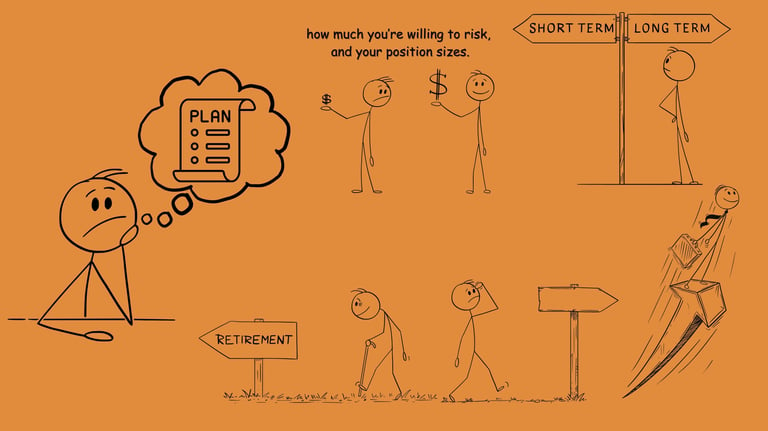How to get your best performance in the market

Trading the market is like navigating a minefield filled with pitfalls and challenges. It's not for the faint of heart, that's for sure! And things only get trickier as you start raking in the big bucks and have killer performance.
It's easy to get caught up in the highs of success and forget to prepare for the inevitable lows that come with it.
Remember, it's not just about how high you can climb, but also how well you can handle the fall.
The Real Secret to Trading Success: Handling the Unexpected, being Adaptable and Flexible
Think knowing when to buy and sell guarantees you’ll crush it in the market? Think again. While it’s crucial to pick the right financial instruments and decide on the best times to enter and exit trades, these steps alone don’t ensure smooth sailing. The real game-changer is knowing what to do when things don’t go your way. Markets can be unpredictable, and even the most well-researched trades can turn against you in a flash. Being prepared for those moments, understanding how to manage your losses, and knowing when to cut your losses or adjust your strategy—that's where the magic happens.
When the market throws a curveball, the best traders stay cool and collected. They don’t let their egos get in the way, and they certainly don’t panic. Instead, they assess the situation, stick to their risk management plans, and make calculated moves to minimize the damage. It’s all about being adaptable and learning from every experience, even the losses. So, the next time you’re planning your trading strategy, remember that being prepared for the unexpected is just as important as picking the right stocks. Stay humble, stay flexible, and always be ready to adjust your course when the market surprises you. That's the true key to lasting success. Now let's talk about your 3 keys to success!





Discipline : Getting the Hang of Discipline in Technical Analysis

So, technical analysis—it's all about reading the past to predict the future, right? We’re talking price charts, volume, and spotting patterns to figure out where things might be heading.
Now, let's dive into why being disciplined is such a big deal when you're doing this.


Know Yourself First
Before you dive into trading, it's super important to understand why you're doing it and what kind of person you are. Are you in it for the long haul, building wealth over time, or are you looking for some quick wins?
Your game plan will depend a lot on these goals.
Think about your personality too—do you like taking risks, or do you play it safe? It's funny how sometimes our trading decisions don't match our real-life characters. Like, a cautious person might take risky trades hoping for fast gains and end up feeling stressed.
Whether you're more of a short-term trader or a long-term investor will also shape your strategy, the tools you use, and decisions like when to take profits. Knowing yourself is the foundation for staying disciplined and making smart moves in the market.
Why Discipline is Your Best Friend
Discipline isn't just a fancy word; it's about sticking to your game plan no matter what. This keeps you cool, collected, and making smart moves, not emotional ones. Trust me, in the wild world of trading, this is gold.
Keeping Emotions in Check
Markets can mess with your head. One minute you’re riding high, the next you’re in a slump. Staying disciplined means you keep your cool and don't make snap decisions when things get crazy.
Stick to the Plan
You’ve got a strategy? Awesome. But the trick is to follow it to the letter. Discipline is what keeps you on track, so you can figure out what’s working and what’s not without second-guessing yourself.
Key Ingredients for a Disciplined Approach
Craft a Solid Trading Plan
What is the initial amount you will begin with, your time dimension, the percentage of gains you plan to make per year, how much of money are you willing to withdraw when you achieve good profits, will you reinvest your profits or not, map out your entry and exit points, the percentage how much you’re willing to risk, and your position sizes. Then, stick to it like glue.
Always keep in your mind that if you find yourself breaking one of your rules then you are getting driven by your emotions
Manage Your Risks
Set stop-loss orders to cut your losses short and decide how much you're willing to risk per trade. Discipline means you follow these rules no matter what.
Keep a Trading Journal
Jot down why you made each trade, how it turned out, and what you learned. This helps you see patterns and improve.
Backtest and Tweak
Test your strategies on past data before going live. Regularly review your performance and make adjustments as needed.
Why Discipline Pays Off
Better Decisions
When you’re disciplined, you make decisions based on solid analysis, not gut feelings. This means fewer bad trades and better overall performance.
Protect Your Money
Good risk management is all about keeping your money safe. Stick to your rules to avoid big losses and stay in the game longer.
Consistent Reviews
A disciplined approach means you’re always reviewing how you’re doing and tweaking your strategy. This keeps you sharp and on top of your game.
Mental Toughness
Trading can be stressful. Discipline helps you stay calm and focused, even when things get rough.
Sticking to It: The Challenges
Sure, it’s easy to say “be disciplined,” but doing it? That’s another story. Here are some common pitfalls:
Emotional Rollercoaster
Fear and greed can mess with your head. Recognizing these emotions and sticking to your plan is key.
Information Overload
There’s a ton of market noise out there. Learn to filter out the junk and focus on what matters.
Overconfidence
A few wins can make you overconfident. Stay humble and stick to your plan.
Impatience
Wanting quick profits can lead to bad decisions. Be patient and wait for the right opportunities.
How to Build Discipline
Create a Routine
Set up a daily routine for market analysis, reviewing your plans, and checking your performance.
Set Realistic Goals
Keep your goals achievable and review your progress regularly.
Keep Learning
Always be learning about the market and improving your skills. This keeps you sharp.
Stay Accountable
Whether it’s to yourself or a mentor, staying accountable helps you stick to your plan.
Wrapping It Up
Discipline is the secret sauce in technical analysis. It helps you make smart, rational decisions and stick to your game plan. By managing your risks, keeping a solid record, and constantly reviewing your performance, you’ll set yourself up for long-term success. It’s not always easy, but the rewards? Totally worth it.


Patience: The Unsung Hero of Technical Analysis

Alright, so you’re diving into the wild world of technical analysis. You’ve got your charts, your indicators, and your patterns all set up. But there’s one thing that’s often overlooked and it’s crucial—patience.
It might not sound as exciting as spotting the perfect head and shoulders pattern, but trust me, patience is what separates the pros from the amateurs.


Why Patience Matters
First off, let’s talk about why patience is so important. The market is a volatile beast. Prices go up, they go down, and sometimes they just sit there doing nothing. If you’re not patient, it’s easy to get caught up in the noise and make hasty decisions that can lead to losses.
Waiting for the Right Setup
One of the biggest mistakes traders make is jumping into a trade too early. You see a pattern forming, and your instinct is to get in on the action before you miss out. But here’s the thing: not every pattern is a winner. By waiting for the right setup, you increase your chances of success. Patience means waiting for confirmation, making sure all your indicators line up before pulling the trigger.
Avoiding Emotional Decisions
Let’s be real, trading can be an emotional rollercoaster. The highs of a winning trade and the lows of a losing one can mess with your head. Patience helps you keep your cool and stick to your plan. It’s about not letting FOMO (fear of missing out) or panic dictate your trades.
The Power of Patience in Strategy
Let’s look at some practical ways patience plays a role in different trading strategies.
Trend Following
If you’re a trend follower, patience is your best friend. Trends don’t form overnight. It takes time for a trend to establish itself, and it takes even more time to ride it. Jumping in too early or exiting too soon can mean missing out on the big moves. Patience allows you to let the trend develop and maximize your profits.
Swing Trading
For swing traders, patience is about waiting for the right entry points. The market doesn’t always provide perfect setups, and sometimes the best move is no move. By being patient, you wait for those high-probability opportunities and avoid overtrading.
Day Trading
Even in the fast-paced world of day trading, patience is key. It might sound counterintuitive, but waiting for the perfect setup within the day can make a huge difference. Instead of chasing every small movement, focus on quality trades that align with your strategy.
Patience in Risk Management
Beyond entry and exit points, patience is crucial in managing your risk.
Setting Stop-Loss Orders
Setting stop-loss orders is a must, but it’s also important to be patient with them. Sometimes the market might hit your stop-loss and then move in the direction you anticipated. While this can be frustrating, being patient means sticking to your plan and not moving your stop-loss out of impatience.
Position Sizing
Another area where patience is vital is position sizing. It’s tempting to go all-in when you feel confident about a trade, but this can backfire. Patience means scaling into positions, testing the waters, and not risking too much of your capital on a single trade.
Psychological Aspects of Patience
Let’s dig a bit deeper into the psychological aspects of patience in trading.
Dealing with Boredom
Trading isn’t always exciting. In fact, a lot of the time it’s pretty boring. But boredom can lead to impatience, and impatience can lead to mistakes. Learning to embrace the boring parts and sticking to your plan is a hallmark of a disciplined trader.
Managing Stress
Stress is a big factor in trading, and it can erode your patience. Techniques like deep breathing, meditation, or even taking a walk can help manage stress levels. The calmer you are, the more patient and rational your trading decisions will be.
Long-Term Patience: The Bigger Picture
While we’ve focused a lot on patience in the short term, long-term patience is equally important. Investing isn’t just about the next trade; it’s about building wealth over time.
Compounding Returns
One of the most powerful concepts in investing is compounding returns. This doesn’t happen overnight. It’s about being patient and letting your investments grow over months, years, and even decades. By being patient, you allow the magic of compounding to work in your favor.
Practical Tips for Staying Patient
Let’s wrap this up with some practical tips you can use to cultivate patience in your trading.
Take Breaks
It’s okay to step away from the screen. In fact, it can be beneficial. Taking breaks can help you clear your mind and return with a fresh perspective.
Limit Screen Time
Constantly watching the markets can erode your patience. Set specific times to check in on your trades rather than staring at the screen all day.
Focus on the Process
Instead of obsessing over outcomes, focus on the process. If you follow your strategy and make disciplined decisions, the results will follow.
Educate Yourself
The more you know, the more confident you’ll be in your decisions. Confidence helps you stay patient, knowing that you’ve done your homework and are making informed choices.
Conclusion
Patience might not be the most glamorous aspect of trading, but it’s one of the most important. It’s what helps you make rational decisions, manage your risk, and ultimately become a successful trader. By developing patience, you’re not just improving your trading skills; you’re setting yourself up for long-term success.
So next time you’re itching to jump into a trade, take a deep breath and remember: patience pays off.
Humbleness: The Humble Trader’s Mindset



Learning from Mistakes
We all make mistakes—especially in trading. The key is to learn from them rather than letting them knock you down. Humbleness allows you to admit when you’re wrong and take the necessary steps to improve. It’s about saying, “Okay, that didn’t work. What can I do better next time?” instead of blaming the market or external factors.
Staying Open-Minded
Humbleness helps you stay open-minded. It’s easy to get stuck in your ways and ignore new information or different perspectives. But the market is constantly changing, and what worked yesterday might not work today. Being humble means you’re willing to listen, learn, and adapt your strategies as needed.
Avoiding Overconfidence
Overconfidence is a trader’s worst enemy. It leads to taking unnecessary risks and making impulsive decisions. Humbleness keeps you grounded and ensures that you’re making decisions based on analysis and logic rather than ego.
Continuous Learning
Never stop learning. The markets are always evolving, and there’s always something new to discover. Read books, take courses, and engage with other traders. The more you learn, the more you realize how much you don’t know, which naturally fosters humbleness.
Humbleness in Strategy Development:
Backtesting and Flexibility
Backtesting is a crucial part of strategy development. It’s tempting to cherry-pick data that supports your hypothesis, but a humble approach involves being brutally honest with your results. If your strategy isn’t holding up under various market conditions, it’s time to go back to the drawing board. Humbleness means being flexible and willing to tweak or even abandon a strategy if it’s not working.
Setting Realistic Expectations
Setting realistic expectations is a big part of managing risk. It’s easy to get carried away with dreams of massive profits, but a humble trader knows that consistent, small gains are more sustainable. This means not overleveraging your positions or taking on more risk than you can handle.
The Downfall of Losing Modesty in Trading
When you lose your modesty in trading, it's a slippery slope. Suddenly, you don't care about managing your risk because you think you can't lose. This is where things start going downhill. You'll start feeling arrogant and making irrational decisions. Sure, people might still follow your lead for a while, but eventually, your integrity and ego will take a hit, and your credibility will go out the window. Take Jesse Livermore as an example—he was a legendary trader who made and lost several fortunes. At his peak, Livermore was worth around $100 million (equivalent to about $1.5 billion today), but his arrogance led him to take excessive risks. He ignored his own rules and ended up losing everything, ultimately taking his own life. Many traders who think they're untouchable end up broke because they ignore the basics of risk management. Staying humble and grounded is key to keeping your trading game strong.
Wrapping It Up
So, to ace this whole technical analysis gig, you need your three best buddies: discipline, patience, and humbleness. Discipline keeps you on the straight and narrow, sticking to your game plan and avoiding those wild, impulsive moves. Patience is all about waiting for those golden opportunities and not letting the market's rollercoaster mess with your head. And humbleness? Well, it keeps you grounded, always learning and adapting, and remembering that no matter how good you get, there's always more to know. Master these three, and you'll be rocking the trading world in no time! 🎯📊
